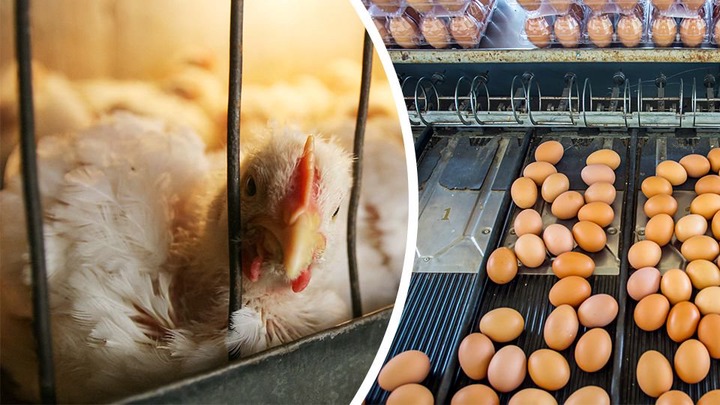
Unfortunately, you’d be sadly mistaken.
Here are five things to avoid, next time you buy eggs.
1. Standard eggs
It’s fair to say that caged hens aren’t very happy. They have no room to move, no access to sunlight and the outdoors, no social interaction with other hens, and they’re fed artificial feed designed not to make them big and healthy, but to make them lay eggs faster. These are not healthy hens, and it means that their eggs aren’t healthy either.
And if the lousy nutrient profile of standard, caged eggs doesn’t put you off them, this should: your conscience! By buying cheap eggs, you’re supporting the inhumane treatment of chickens that deserve better. Like every other living thing, chickens deserve to roam under their own free will and to thrive on the foods and habitats of their choosing. Sticking them into cages isn’t exactly fulfilling that need.
2. Eggs that are cracked
This one might seem like a no-brainer, but I’m constantly surprised to see just how many people buy eggs without actually opening the carton to check the eggs inside. More often than not, those people will get home only to find that at least one of those eggs is cracked and leaking, which means that it’s integrity has been compromised and it’s no longer safe to eat. A study done a while back estimated that cracked eggs are up to 93 times more likely to infect someone with salmonella than intact eggs.
My trick? Open the carton and quickly run your index finger across all the eggs, giving each one a little wiggle. If the egg wiggles in it’s little hole without an issue, it’s usually fine. If it doesn’t wiggle and seems stuck, chances are it’s cracked and the interior has leaked out and stuck to the carton.
3. Eggs that are soiled
If you find yourself having unwittingly bought soiled eggs, give them a good wash under the tap before you crack them. Better yet, soak them in warm, soapy water then rinse them afterward.
4. Cage-free eggs
In many cases these “cage-free” hens are even unhappier than caged hens, as there’s intense competition for space and food amongst the horde of thousands. This means more stress for Henny Penny, and less happiness. Unhappy chickens lay nutrient-poor eggs, meaning you’re getting far less bang for your buck.
5. Free-range eggs
This one is probably the most confusing of all… you thought free-range eggs were the healthy choice, right? I certainly used to, and the higher price of these eggs suggests that they are too.
Nope!
Most “free-range” chickens won’t ever see the light of day, and those that do may only see it for five or ten minutes and have no opportunity to forage for the foods they actually thrive on. This means that most free-range eggs aren’t really any better than cage-free eggs.
Choosing the best eggs for your health and conscience
Here are a list of best eggs to worst, so you can make an informed decision next time you peruse the cartons:
- Pastured, organic eggs: these are the cream of the crop, laid by hens who are able to roam free, eat bugs and seeds supplemented by organic feed, and sleep in clean, comfortable coops.
- Pastured eggs: usually just as healthy, but without the organic certification.
- Organic eggs: these don’t guarantee as much free roaming as pastured eggs, but there are certain legal requirements to provide more space for these hens and you at least know that the feed is healthy and free of antibiotics and growth hormones.
- Free-range eggs with added omega-3: Chickens that don’t get to roam as much generally have lower beneficial fatty acid profiles. These hens get extra omega-3s in their diet, which improves the nutritional status of the eggs a little.
- Free-range eggs: okay, but not great.
- Cage-free eggs: pretty darn bad.
- Caged eggs: bad, pure and simple.
